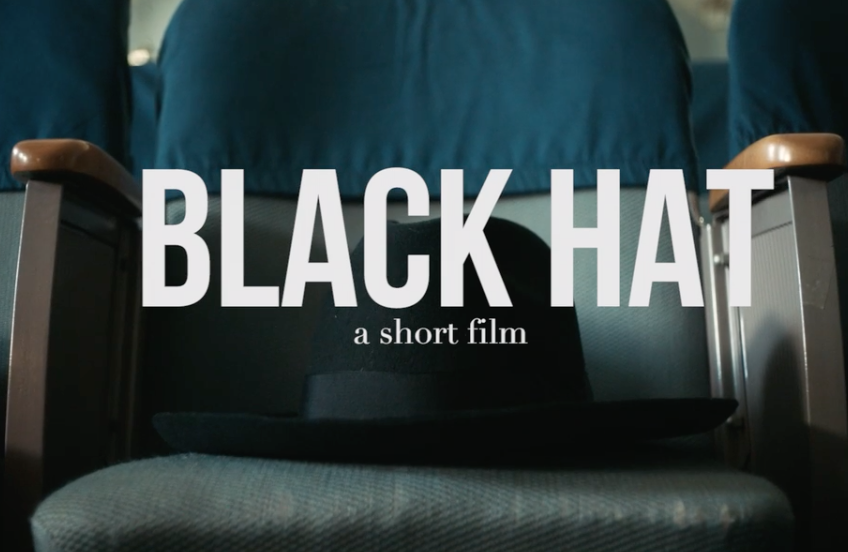
Making “Black Hat”: Director Sarah Smith Tells All
A short film like “Black Hat” can’t go into the politics of everyday life in the way a feature film can. Instead, we offer viewers a slice of life in which Shmuel depicts his spiritual struggle. We did not want to judge him or the community. This is the story of a man trying to find his voice, his place in the world—which I hope is something that anyone can relate to. As for the filmmaking, there were some technical things that were really important to me. For example, I wanted to put Shmuel inside a frame, to show him confined by custom and situation. Then, when he got to the bar, there was a less restrictive, more open, and colorful setting. I felt this was a way to make a thematic, unspoken statement.
EJB: How did you come to direct this particular film?
SS: This is a story that Phillip was passionate about telling. In addition to being a writer, Phillip is also a social worker, and while he was in school, he interned at Footsteps, an organization that helps people who are considering leaving ultra-religious Jewish communities. He had worked with people like Shmuel who were unsure about their place in both Jewish and LGBTQ life. Because of this work, he was familiar with the internal emotional struggle between ultra-orthodox and secular lives, themes he brought to the script.
In addition, he and I are friends. We’ve known each other for about 15 years. We trust each other creatively and have a similar sense of humor, which really helps.
EJB: Did you really do all the filming in one weekend?
SS: Well, before the filming began, we spend about two months doing pre-production. During that time, we did the casting, got the necessary insurance, found the locations we needed, determined what crew we needed, and figured out what equipment we had to have. We also found the right hair and make-up people. We spent three days filming.
EJB: Tell me about casting the film.
SS: We had a fabulous casting director named Kimberly Graham. We wanted to see what kind of chemistry different people had with each other. Even on tape, Adam, who plays Shmuel, was so connected to the material and so in the moment. He had a kindness that was immediately engaging and relatable.
When we shot the film’s bar scene, we knew that he and Sebastian, who plays Jay, had to have some chemistry even though the situation might be awkward or anxiety ridden. We wanted the scene to be about two people finding a moment of connection. That was our goal.
EJB: How about the locations?
SS: Yaniv was able to find a conservative congregation in Venice, California, that was open to us filming a minyan inside the sanctuary. This was a challenge because we knew that Hasidic synagogues would not let us bring cameras in and we wanted to have a location that felt authentic. We were very grateful to find the synagogue we used.
The other locations in the film were easier to find. The apartment that Shmuel lived in belongs to a friend of Yaniv’s and Phillip found the dry cleaners Shmuel manages and the bar he visits, which are both in the Fairfax section of L.A. It’s a very mixed neighborhood.
EJB: Has the Hasidic community responded to the film?
SS: We did not make “Black Hat” for the Haredi community, but of course, we’d love them to see it and embrace it. Our aim, however, was to show that ultra-Orthodox people are going through the same emotional stuff as everyone else, and that maybe, those of us living outside the community can reach out, say hello, and connect in some small way. When we stop making people “the other,” when we know a little more about someone, maybe we can live in a less divided and more inclusive, safer, world.
EJB: How about the general more secular audience?
SS: Fairly positive. We were thrilled to be honored with Best LGBT Short at the American Pavilion; the Audience Award at the Washington DC Jewish Film Festival; and Honorable Mention at OUTShine. It was also a Jury’s Choice winner at the Black Maria Film Festival.
EJB: What are you working on now?
SS: I’m editing a feature-length documentary about Kenyan-born Oria Douglas-Hamilton who, with her husband Iain Douglas-Hamilton, founded Save the Elephants. And I’m working on a few shorts, an action film dealing with the theme of pay equality and another one about Martha Mitchell [1918-1976], the outspoken wife of Richard Nixon’s Attorney General, John Mitchell.



